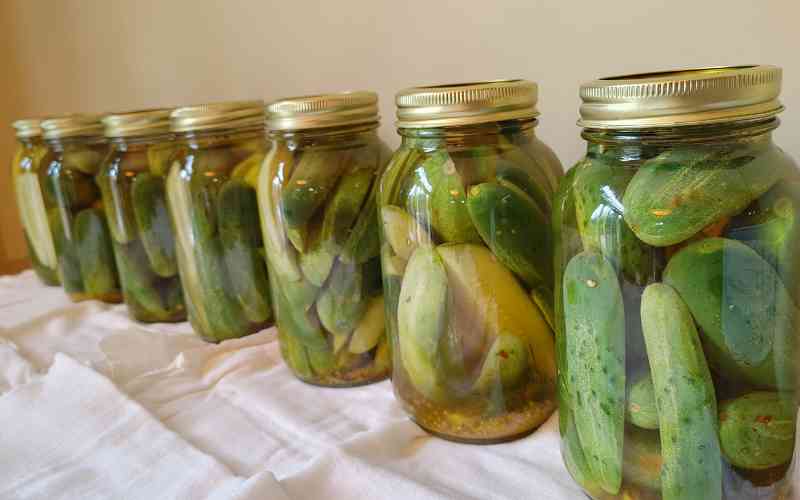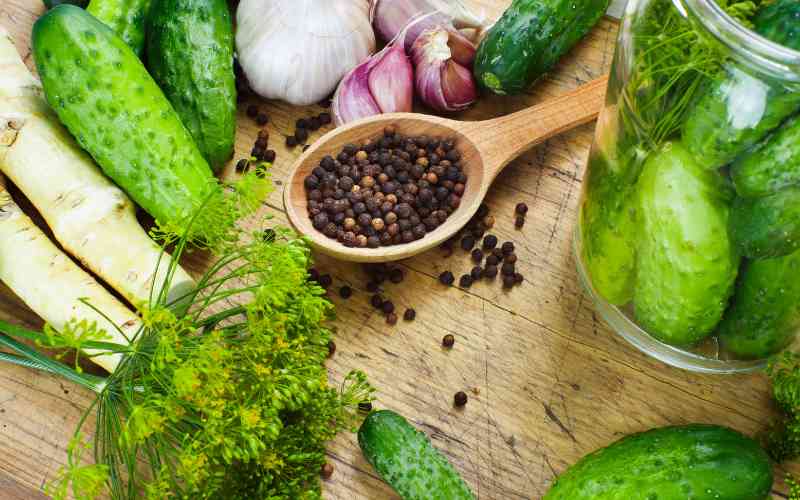Homemade pickles are a delicious way to preserve fresh vegetables. It adds a tangy flavor to your meals. However, one common problem that many people face when making pickles at home is that they turn out soft instead of crunchy. Annoying. Right?
Soft pickles can be disappointing and may not have the desired texture and flavor. Why are homemade pickles soft? In this article, we will explore some possible reasons why your homemade pickles are soft and provide some tips on how to make them crispier.
Contents
Why Are My Homemade Pickles Soft?
1. Insufficient Salt Or Vinegar
One of the main reasons why homemade pickles may turn out soft is that there is not enough salt or vinegar in the recipe. Salt and vinegar are essential for the pickling process.
This is because they help to preserve the vegetables and create the tangy flavor that pickles are known for. If you use too little salt or vinegar, the pickles may not pickle properly and may become soft.
To ensure that your pickles turn out crispy, make sure to follow the recipe carefully and measure out the salt and vinegar precisely. If you are using a recipe that you have created yourself, be sure to include enough salt and vinegar to achieve the desired flavor and texture.
2. Using the wrong type of cucumber
The type of cucumber you use can also affect the texture of the pickles. Some cucumbers are better suited for pickling than others. For example, pickling cucumbers are smaller and firmer than regular cucumbers. This is because they have thinner skin that is less likely to become tough during the pickling process.
If you are using regular cucumbers for pickling, you may need to peel them or remove the seeds to prevent them from becoming soft. Alternatively, you can look for pickling cucumbers at your local farmers’ market or grocery store.
3. Incorrect brine temperature
The temperature of the brine can also affect the texture of the pickles. If the brine is too hot, it can cause the vegetables to become soft. On the other hand, if the brine is too cold, it may not penetrate the vegetables properly, resulting in soft pickles.
To avoid this problem, it is essential to follow the recipe instructions for the brine temperature. Generally, the brine should be heated to boiling and then allowed to cool before adding the vegetables.
4. Overcooking the pickles
Overcooking the pickles can also cause them to become soft. It happens either way. If you leave the pickles in the brine for too long or cook them for too long, they may lose their crunchiness.
To ensure that your pickles are crisp, it is important to follow the recipe instructions carefully and not overcook them. You should also promptly remove the pickles from the brine and store them in the refrigerator or process them for canning as soon as possible.
5. Not processing the jars properly
If you are canning your pickles, it is essential to follow the proper canning procedures to ensure that they are preserved correctly. The pickles may become soft or spoil if the jars are not processed properly.
To avoid this problem, make sure to follow the canning instructions carefully and use the correct equipment. You should also check the seals on the jars to ensure that they are airtight.
6. Inadequate water hardness
Water hardness refers to the number of minerals present in the water, such as calcium and magnesium. If the water you are using to make the brine or soak the vegetables is too soft, it may cause the pickles to become soft. This is because the minerals in hard water help to keep the pickles firm.
To ensure that your pickles are crisp, it is recommended to use hard water for the brine or soaking process. If you are unsure about the hardness of your water, you can purchase test strips to check the mineral content.
7. Using too much sugar
While sugar can be added to pickling recipes to balance the acidity and add flavor, using too much sugar can also cause the pickles to become soft. This is because sugar can slow down the fermentation process and prevent the pickles from developing their characteristic crunchiness.
If you want to add sugar to your pickling recipe, it is important to use it in moderation and not exceed the recommended amount. You can also experiment with alternative sweeteners, such as honey or maple syrup, to achieve the desired flavor without affecting the texture.
8. Poor storage conditions
After the pickles are made, it is important to store them properly to ensure they remain crisp. If the pickles are stored in warm or humid conditions, they may become soft or spoil. It is recommended to store pickles in a cool, dry place or in the refrigerator.
If you have canned your pickles, make sure to store them in a cool, dark place and check the seals on the jars regularly to ensure that they are still airtight. If you notice any signs of spoilage, such as a bulging lid or an off smell, discard the pickles immediately.
Related: What Vegetables Or Fruits Have similar Qualities To Tomatoes?
How To Keep Pickles Crunchy And Firm

Pickles are a popular food item that can be enjoyed as a snack or used as a condiment. Most people prefer their pickles to be crunchy and firm. Here are some tips on how to keep pickles crunchy and firm:
Use fresh cucumbers:
Pickles are made from cucumbers, and using fresh cucumbers is essential for ensuring the pickles are firm and crunchy. Avoid cucumbers that are overripe or have soft spots.
Soak the cucumbers in ice water:
Soaking cucumbers in ice water for a few hours before pickling can help them retain their crunchiness.
Cut cucumbers into uniform pieces:
Cutting the cucumbers into uniform pieces can help ensure that they all pickle evenly, which can help prevent some from becoming overly soft.
Use a pickling salt:
Using a pickling salt that does not contain any anti-caking agents or iodine can help ensure that the pickles remain firm and crunchy.
Add grape leaves or tea leaves:
If you add grape or tea leaves to the pickling jar can help keep the pickles firm and crunchy due to the tannins they contain.
Don’t overcook the pickles:
Overcooking the pickles can make them soft and mushy, so be sure to follow the recipe and cooking time carefully.
Store the pickles properly:
Store your pickles in the refrigerator. It will help keep them firm and crunchy. Additionally, avoid storing the pickles in metal containers, as the metal can react with the pickles and make them soft.
Related: What To Serve With French Onion Soup: 10 Must-Try Parings
Conclusion
There are several reasons why homemade pickles may turn out soft. We have helped you point out the reasons and what you can do to correct them.
By following the tips outlined above and being careful to follow the recipe instructions, you can make sure that your pickles are crisp and delicious every time.

